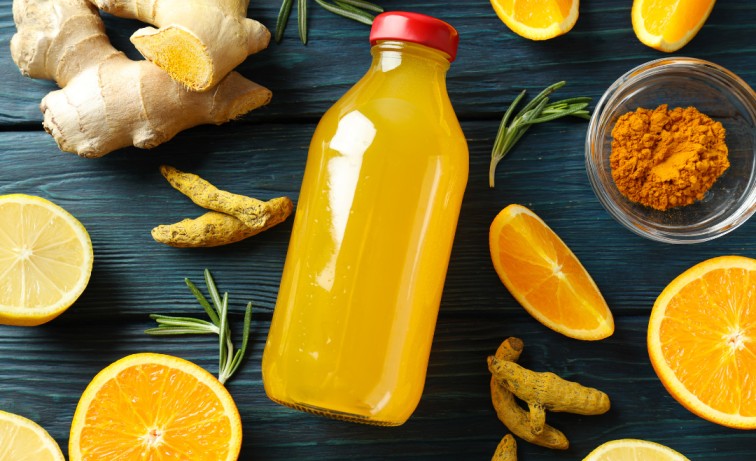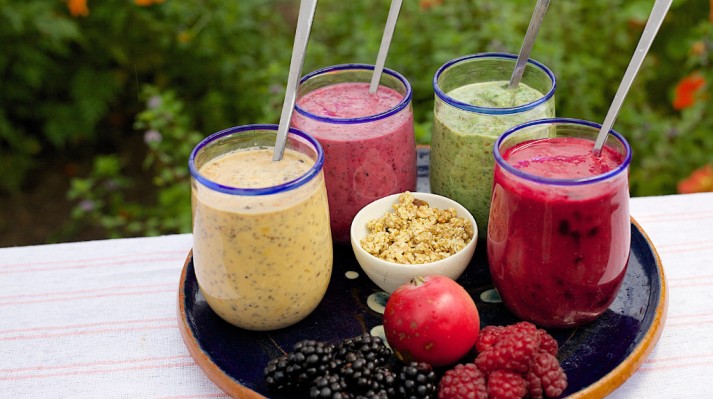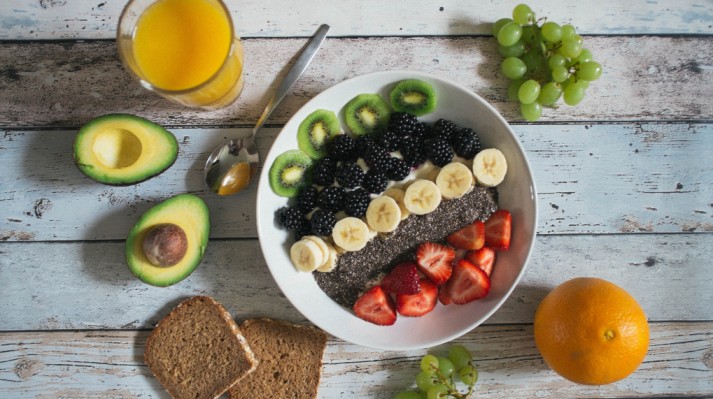As a registered dietitian, I have always counseled my patients to adopt a healthy diet rich in nutrients. As for protecting against grave conditions, such as stroke, what we eat is critical. The Stroke Prevention Diet is not a short-term program but a long-term meal plan for a healthier lifestyle. It’s much easier to help prevent a stroke by focusing on anti-inflammatory diets that help regulate blood pressure and are typically good for the heart. Subtle alterations in the daily diet can help make a huge difference in the quality of your health in the long run.
Tips For Healthy Eating and Stroke Prevention
1) Fruits &Vegetable Intake
One’s best bet in avoiding a stroke is to take more fruits and vegetables in their day-to-day diet. The foods are loaded with vitamins, minerals, and antioxidants that work to prevent the blood vessels from getting damaged or inflamed. To prevent stroke, I advise taking at least five portions per day with a focus on green vegetables, berries, citrus fruits, and other cruciferous vegetables such as broccoli and cauliflower. These foods’ antioxidants eliminate free radicals that can harm the brain as well as the blood vessels, thus lowering the risk of stroke.
2) Choose Whole Grains
Complex carbohydrates such as brown rice, oats, quinoa, and whole wheat bread are a must in a diet that is recommended for stroke prevention. These grains are rich in fiber, which reduces cholesterol and blood sugar levels in the body. Whole grains contain their nutrient-filled bran and germ, unlike refined grains, which hampers heart health. Eating whole grains daily reduces the formation of plaque in the arteries, which results in stroke.
3) Include Healthy Fats
Not all fats are evil. Good fats, such as the unsaturated fats of avocados, olive oil, nuts, and fatty fish, are helpful to the brain and the heart. Fish, flax seeds, and chia seeds are especially desirable, as omega-3 fatty acids decrease inflammation and maintain the elasticity of blood vessels. Limiting the consumption of foods high in saturated and trans fats is the main way of avoiding the build-up of plaque in the arteries that can cause blood clots in the brain.
4) Limit Salt Intake
High blood pressure, which is a significant risk factor for strokes, is caused by excessive salt intake. Sodium makes the body hold water and also increases the amount of fluid that circulates in the arteries leading to high blood pressure. According to the American Heart Association, the sodium intake should be below 2,300 mg daily, but the optimal intake is approximately 1,500 mg. To minimize your salt consumption, concentrate on fresh foods, avoid processed meals, and use spices instead of salt to enhance the flavor.
5) Control Cholesterol Levels
The high levels of cholesterol cause the formation of plaque within the blood vessels and so a stroke may occur. If you want to reduce cholesterol levels, start using products containing soluble fiber from oats, beans, and finally, fruits. One also gets to use healthy fats such as olive oil, nuts, and fish, among others, to enhance the cholesterol ratios. Omega-3 fatty acids found in foods such as salmon, mackerel, and flaxseeds decrease clot formation and artery inflammation.
6) Moderate Alcohol Consumption
Excessive consumption of alcohol causes an increase in blood pressure and hence increases the risk of stroke. However, moderate consumption of alcohol, including red wine, can be beneficial based on its antioxidant properties. It’s all about moderation here which means that women should not take more than one drink a day while men should not take more than two. Beyond this, it can raise blood pressure and obesity risk and have adverse effects on cholesterol levels, all of which can result in strokes.
7) Stay Hydrated
Dehydration can make the blood of the body thicken and lead to the formation of clots, which in turn causes strokes. Consuming a large amount of water in a day has a significant role in regulating the viscosity of the blood and the blood vessels. I suggest increasing the daily water intake to a minimum of eight glasses a day. Do not take a lot of sweetened beverages and too much caffeine, as it leads to extreme dehydration and high blood pressure.
8) Avoid Processed Foods
Canned and packaged foods are usually rich in saturated fats, sugar, and salt, all of which are known to boost the stroke risk. Snacks such as chips, cookies, and fast foods contain trans fats and refined carbohydrates that increase cholesterol and obesity. Instead, focus on whole-natural foods that are good for the body and help to prevent heart diseases and stroke.
The Best Ways To Help Prevent a Stroke
It is always better to prevent rather than to treat, especially when it comes to a condition like a stroke. Besides dieting, exercising, minimizing stress, and sleeping adequately, several other measures can minimize the risk of stroke. Exercise assists in weight control, decreases inflammation levels, and keeps the heart healthy. Coping strategies like meditation and deep breathing exercises also assist in reducing blood pressure and other cardiovascular-related illnesses. Lastly, ensure that you are having 7-8 hours of good quality sleep in a day. Lack of sleep raises blood pressure and brings about inflammation, which are some of the factors that cause strokes. Following a stroke prevention diet can help align with all the above measures and help you be consistent in the evasive steps against strokes.
Diet For Stroke Prevention
The two recommended dietary patterns for stroke prevention are the Mediterranean diet and the DASH diet. Both diets encourage the use of fresh and natural foods and have been found to lower blood pressure and cholesterol, which are associated with stroke risks.
Mediterranean Diet: This diet entails a high intake of fruits, vegetables, whole grains, pulses, and healthy fats in the form of olive oil and fish. It restricts the consumption of red meat and processed foods. Research indicates that the Mediterranean diet reduces the prevalence of cardiovascular diseases and strokes.
DASH Diet: Intended for controlling blood pressure, the DASH diet includes fruits, vegetables, whole grains, lean meat, and low-fat dairy products and restricts sodium, sugar, and saturated fats. Clinical studies have demonstrated its benefits in controlling hypertension and preventing stroke in general.
These two diets can be modified to personal taste, but the important thing is that the diet plan should be followed religiously. Adherence to such diets results in positive long-term outcomes, such as the prevention of strokes.
Conclusion
A Stroke Prevention Diet is not a short-term change but a lifelong change for the better of your heart and brain. Including more whole foods, healthy fats, and fiber in your diet can help you reduce your risk of a stroke to a large extent. It is also necessary to reduce the amount of salt, processed foods, and alcohol as these lead to high blood pressure as well as blockages of arteries. Diet is the most prominent form of prevention when it comes to strokes to enable you to live a healthier and fuller life. At Qua Nutrition, our nutritionists help curate personalized stroke-prevention diets to help you stay healthy. Contact us and adopt a better lifestyle with QUA Nutrition.
Frequently Asked Questions (FAQ)
1. What is the most important food group in a stroke-prevention diet?
As a dietitian, I recommend focusing on fruits and vegetables as they are high in antioxidants, vitamins, and fiber that protect your blood vessels and reduce stroke risk.
2. How does salt affect stroke risk?
Salt increases blood pressure, which is a major risk factor for strokes. Reducing your sodium intake helps maintain healthy blood pressure levels.
3. Can I still eat fats on a stroke-prevention diet?
Yes, but choose healthy fats from sources like avocados, nuts, and olive oil. These fats support heart health and can help reduce inflammation in the arteries.
4. Are there specific diets recommended for stroke prevention?
The Mediterranean and DASH diets are excellent for stroke prevention because they focus on whole foods, healthy fats, and low sodium, which benefit heart and brain health.
5. Is it necessary to completely avoid alcohol?
Moderation is key. Drinking alcohol in moderation, such as one glass of red wine a day, may have heart health benefits. However, excessive drinking can increase stroke risk.










Your blog post was the perfect blend of informative and entertaining. I couldn’t tear my eyes away from the screen!